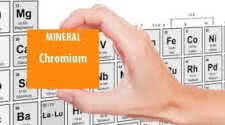Chromium & Bodybuilding - Can this Supplement Be Beneficial or Toxic?

Understanding the Potential Side-Effects of Supplements is Critical
What exactly is the latest information on the much talked about supplement chromium? It's been speculated that
it boosts insulin but it is possibly toxic. Is it worth adding to a daily bodybuilding supplement regimen?
For years, we have been bombarded with messages that chromium burns fat and builds muscle. We've also been told
that it is toxic and should be avoided. In fact both the upside and downside of chromium have been exaggerated.
Chromium supplementation can be useful for bodybuilders and avid exercisers alike. With the price of a bottle
of chromium pills at an all time low, you can't go wrong consuming chromium on a daily basis. The benefits may
be a little subtler than the fat- burning claims many manufacturers assert, but chromium should not be
overlooked as a tool for an improved physique and disease prevention.
Chromium has several different forms: Common supplemental forms are not toxic and are considered safe in doses
as high as five milligrams (mg) per day. There is no government standard for chromium intake; however, 50-200
micrograms (mcg) per day is suggested. based on both animal and human clinical data. With absorption rates
limited to 0.5%, an overdose of chromium is almost impossible. The exact amount of chromium needed and its
mechanism of action in humans is still unknown; yet we see the advantages of chromium supplementation by looking
at deficiency states.
To heifer understand the benefits of chromium to bodybuilders, it's important to look at research performed on
the obese, which shows that supplementation with chromium improves glucose utilization and insulin action.
Chromium is thought to work by improving insulin binding to cells, increasing receptor numbers, facilitating
insulin's internalization (utilization), improving beta-cell sensitivity, activating insulin- receptor enzymes
and promoting post-receptor events. Although it's clear that chromium is beneficial for unhealthy populations
the preventative and positive effects on bodybuilders and other athletes are also worth exploring.
Insulin is the master hormone for athletes attempting to put on lean mass without adding fat. By controlling
insulin efficiency, bodybuilders can more effectively utilize carbohydrates and proteins. If insulin function
is impaired, more insulin is required to do the same lob. Too much insulin only serves to promote fat production,
in turn producing a smoother. less ripped physique. By enhancing the effectiveness of insulin via chromium
supplementation, a bodybuilder may improve the process of building lean muscle tissue without the addition of
fat that comes with excess insulin production.
In endurance athletes, chromium excretion can be five times greater than that of the average couch potato. This
may be due to the increased amounts of glucose utilization during intense exercise. Chromium supplementation
can help sustain an endurance athlete's ability to utilize glucose properly and maintain training intensity.
This also holds true for bodybuilders performing extra cardio to lean out. By supplementing with chromium, you
can help maintain your body's enhanced response to cardiovascular exercise and fat-burning.
Since the efficiency of insulin is improved when chromium status is adequate, it makes sense to include the
supplement in your daily regimen. The average diet is deficient in chromium - even bodybuilders who consume up
to 5,000 calories a day would be hard- pressed to get adequate amounts of it from their food. Good dietary
sources of chromium are simply difficult to come by on a regular basis; oddly, one of the best sources of
chromium may be tap water. Fruits, vegetables, whole grains and seeds supply some chromium, although it is often
not bioavailable (absorbed into the body) from these items. Chromium is also readily leached out of foods
prepared in stainless steel food-processing equipment, especially if the food itself is acidic.
A year's supply of chromium (200 mcg per day) costs less than $25. Since chromium's dietary sources are scarce
at best, supplementation may be the most efficient way to get adequate amounts. The most common supplemental
forms are chromium picolinate and chromium nicotinate. Although more research has been done on chromium
picolinate, either form is adequate.
Recent analysis indicates that supplementing with as little as 200 mcg per day can improve insulin function.
For bodybuilders consuming large amounts of protein and carbs, 400-800 mcg is probably an appropriate daily
dosage. Larger doses are best divided up over the day, since absorption data shows that lower intestinal amounts
are absorbed at better rates than a single large dose. Regardless of your reason, supplemental chromium is good
insurance against insulin-related disease, and it just might give you an added edge in muscular gains and lower
bodyfat.